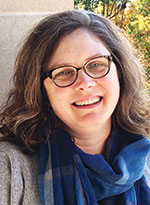Worship and Evangelization Outreach / Erin Jeffries
Celebrating the sacraments with persons with disabilities
 I recently got a call from one of our wonderful parish catechetical leaders about a young lady she was helping to prepare to receive her first holy Communion. The young lady is autistic and has a very short attention span, so the family was not sure that she would be able to sit through an entire Mass. We discussed options that might be available to her, including perhaps celebrating at a daily Mass, or possibly even at their home.
I recently got a call from one of our wonderful parish catechetical leaders about a young lady she was helping to prepare to receive her first holy Communion. The young lady is autistic and has a very short attention span, so the family was not sure that she would be able to sit through an entire Mass. We discussed options that might be available to her, including perhaps celebrating at a daily Mass, or possibly even at their home.
Over the summer, families and individuals may be pondering the possibility of looking ahead to preparing to receive one or more of the sacraments of initiation (baptism, first holy Communion and confirmation). This could be children who are preparing with their grade level class, a teenager preparing for the sacrament of confirmation or perhaps an adult who never received the sacraments.
All sorts of questions such as the scenarios above can come up as to how to approach celebrating sacraments with persons who have disabilities for the individuals themselves, for their families and for those who are working to give them the best preparation possible to receive these wonderful graces.
If this sounds like you, starting this month there is a new tool available from the National Catholic Partnership on Disability (NCPD), an online course designed as a resource for those who are preparing children or adults with disabilities to receive the sacraments of initiation—with an additional module devoted to the sacrament of reconciliation.
Each of the eight modules contains written, audio and video resources to explore the topic, as well as an opportunity for weekly reflection. Each will focus on the topic from three perspectives.
First, considering the sacrament or teaching from the perspective of Scripture; secondly, a mini lecture which explores the topic from the perspective of Church teaching and liturgical practices, as well as personal experience; and finally a podcast, which includes practical considerations for preparing someone with a developmental disability to receive the sacrament.
The podcasts feature interviews with people like Dr. Timothy O’Malley of the University of Notre Dame, self-advocate Meghan Concagh and Mary Lenaburg, a Catholic writer, speaker and mother of a daughter with disabilities.
The course was written by Michele Chronister, who is a national expert on the topic of faith and disability. She has presented at dioceses across the country and authored the book, Handbook for Adaptive Catechesis. She is passionate about training parish leaders to teach the faith to persons with disabilities in a way that upholds the complexity and richness of the faith tradition.
In a blog post about the course, Chronister stated:
“Providing access to preparation for and reception of the sacraments for persons with disabilities is not just some service we provide for them. When persons with disabilities receive the sacraments … their encounter with God strengthens and builds up the Church. We need them.
“But also, God longs deeply for them and deeper union with them, as he does with all of us. And he desires sanctity for those with disabilities, just as he does for those without disabilities. He wants to make us saints.”
I was honored to be a part of helping this course come to fruition and am excited to share it with our parishes and families. I am even more excited to share that, as an NCPD affiliate, all of our parish members receive a discount on the cost of the course through the end of August. I am confident that this will be a tremendous resource for you.
You can find out more about the course, including excepts and a course outline, at www.ncpd.org.
(Erin Jeffries is the coordinator of Ministry to Persons with Special Needs for the Archdiocese of Indianapolis. She can be reached at ejeffries@archindy.org or 317-236-1448. Find out more about this ministry and other resources by visiting www.archindy.org/specialneeds or www.archindy.org/deaf.) †
 I recently got a call from one of our wonderful parish catechetical leaders about a young lady she was helping to prepare to receive her first holy Communion. The young lady is autistic and has a very short attention span, so the family was not sure that she would be able to sit through an entire Mass. We discussed options that might be available to her, including perhaps celebrating at a daily Mass, or possibly even at their home.
I recently got a call from one of our wonderful parish catechetical leaders about a young lady she was helping to prepare to receive her first holy Communion. The young lady is autistic and has a very short attention span, so the family was not sure that she would be able to sit through an entire Mass. We discussed options that might be available to her, including perhaps celebrating at a daily Mass, or possibly even at their home.